The rapid rise of the COVID-19 pandemic has also, unfortunately, provided ample opportunity for cyber criminals.
The Australian Cyber Security Centre (ACSC) is aware of a significant increase in Australians being targeted with COVID-19 related scams and phishing emails.
In the last three months, the ACSC and the Australian Competition and the Consumer Commission’s (ACCC) Scamwatch has received over 140 reports from individuals and businesses across Australia.
These phishing emails are often sophisticated, preying on people’s desire for information and imitating trusted and well-known organisations or government agencies.
Clicking on these malicious links or visiting fake websites may automatically install computer viruses or malware and ransomware onto your device, giving cyber criminals the ability to steal your financial and personal information.
COVID-19 scams are expected to increase in coming weeks and month, and businesses and consumers are being urged to remain alert.
Examples of such scams include:
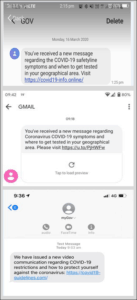 1. SMS phishing scam
1. SMS phishing scam
This SMS phishing scam provides information on where to get tested for COVID-19 or how to protect yourself
In these examples, the SMS appears to come from ‘GOV’ or ‘GMAIL’, with a malicious link to find out where to get tested in your local area.
Scamwatch and the ACSC is also aware of a SMS scam using the sender identification of ‘myGov.’ These scam messages are appearing in the same conversation threads as previous official SMS messages you may have received from myGov.
2. Phishing email impersonating Australia Post
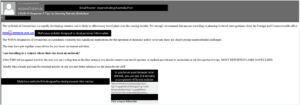 A COVID-19 phishing email impersonating Australia Post aims to steal personal information.
A COVID-19 phishing email impersonating Australia Post aims to steal personal information.
Under the pretence of providing advice about travelling to countries with confirmed cases of COVID-19, this phishing email aims to trick you into visiting a website that will steal your personal and financial information.
Once they have your personal information, the scammers can open bank accounts or credit cards in your name, often using these stolen funds to purchase luxury items or transfer the money into untraceable crypto-currencies such as bitcoin.
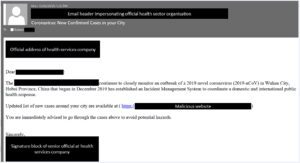 3. Phishing emails pretending to be health sector organisation
3. Phishing emails pretending to be health sector organisation
This is an example of one COVID-19 themed phishing email where the sender is pretending to be a well-known international health organisation.
The email prompts you to click on the web link to access information about new cases of the virus in your local area, or to open an attachment for advice on safety measures to prevent the spread.
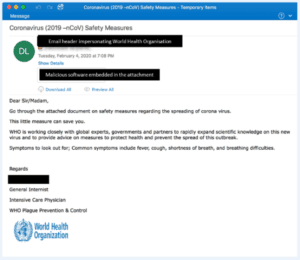 4. Phishing emails containing malicious attachments
4. Phishing emails containing malicious attachments
This phishing email example is pretending to be from the World Health Organization and prompts you to open an attachment for advice on safety measures to prevent the spread of COVID-19.
When opened, the attached file contains malicious software that automatically downloads onto your device, providing the scammer with ongoing access to your device.
5. COVID-19 relief payment scam
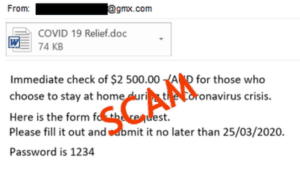 Scammers are also sending phishing emails targeting an increasing number of Australians that are seeking to work from home, wanting to help with relief efforts or requiring financial assistance if they find themselves out of work.
Scammers are also sending phishing emails targeting an increasing number of Australians that are seeking to work from home, wanting to help with relief efforts or requiring financial assistance if they find themselves out of work.
This email example offers recipients $2,500 in ‘COVID-19 assistance’ payments if they complete an attached application form. Opening the attachment may download malicious software onto your device.
How to Protect Your Business
There are a number of ways you can protect yourself and your business from COVID-19 scams:
- Read the message carefully, and look for anything that isn’t quite right, such as tracking numbers, names, attachment names, sender, message subject and hyperlinks.
- Educate your employees on how to recognise phishing and scam emails
- If unsure, call the organisation on their official number, as it appears on their website and double check the details or confirm that the request is legitimate. Do not contact the phone number or email address contained in the message, as this most likely belongs to the scammer.
- Use sources such as the organisation’s mobile phone app, web site or social media page to verify the message. Often large organisations, like Australia Post, will have scam alert pages on their websites, with details of current known scams using their branding, to watch out for.
- Implement COVID-19 Business Continuity planning
- Understand the importance of cyber security for your business
- Implement a laptop security policy. This is particularly important for remote work.
If you’ve received one of these messages and you’ve clicked on the link, or you’re concerned your personal details have been compromised, contact your financial institution immediately.
For expert advice and assistance on cyber security in your business, contact Surety IT today.




